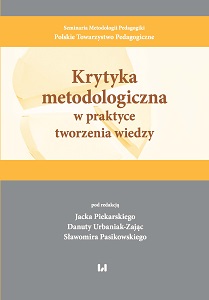Od uniwersalności do partykularności metody badawczej
From the universality to the particularity of the research method
Author(s): Danuta Urbaniak-Zając
Subject(s): Education
Published by: Wydawnictwo Uniwersytetu Łódzkiego
Keywords: scientific method;research method;normative methodology;ethics in research
Summary/Abstract: The aim of the chapter is to discuss the conditions for changing the status of the research method and consequences of the change. In the traditional approach, the research method is a refinement of the scientific method, which is an emanation of the ideal of modern science. So, the rules that govern the research method follow the science ideal. As long as one pattern of science existed, the method of natural sciences was considered commonly obligatory and did not require separate justifications. In the chapter, the author signals the genesis of the special position of the method in modern science and draws attention to the consequences of W. Dilthey's exclusion of humanistic sciences (including contemporary social sciences) from empirical knowledge, then focuses on conditions that impaired the autonomy of the research method. She discusses the consequences of this change for the practice of qualitative empirical research. In conclusion, the author refers to the links between the research method, the research subject and the assumptions referring to it; and signals the change of function and position of the method (it does not reflect reality in a realistic way, but shows how it can be understood; and thus it becomes a part of the problem being studied by means of the method). The task of methodological critique is reflection on research practice, reconstruction of contexts and assumptions adopted as parts of various research projects, which may serve to weaken the "methodological separatisms".
Book: Krytyka metodologiczna w praktyce tworzenia wiedzy
- Page Range: 99-112
- Page Count: 14
- Publication Year: 2019
- Language: Polish
- Content File-PDF

